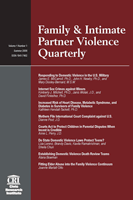Applying Trauma-Informed Practices to Our Work
Author: Loree Cook-Daniels, M.S..
Source: Volume 05, Number 03, Winter 2013 , pp.225-234(10)

< previous article |next article > |return to table of contents
Abstract:
Loree Cook-Daniels provides us with a compendium of the best of our knowledge as far as understanding the role of early life trauma in the later well-being of elderly persons. We know that childhood abuse, sexual and otherwise, is far more common than previously believed, and so we may assume that such abuse is equally common among the elderly. Thus, if we want to be effective with mentally ill, substance-dependent, or other elderly clients, we need a deep understanding of how earlier trauma echoes throughout people’s lives and in their thoughts, feelings, and behaviors. As common and problematic a history of trauma is for our clients, even seasoned clinicians often misunderstand why their clients do what they do. What clinicians really need to understand is that early abuse leaves behind characteristic marks on the human psyche, often“setting people up” for a pattern of re-victimization throughout their lives, particularly in their later years—like the abhorrent “gift” that keeps on giving, including, to its victims, mental illnesses, serious health problems, and even early death.Keywords: post-traumatic stress disorder (PTSD); reactive mechanisms; APS interventions
Affiliations:
1: FORGE.